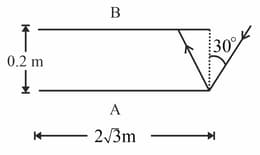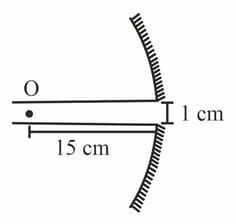Anil Ahlawat Solutions for Chapter: Light-Reflection and Refraction, Exercise 2: EXERCISES
Anil Ahlawat Science Solutions for Exercise - Anil Ahlawat Solutions for Chapter: Light-Reflection and Refraction, Exercise 2: EXERCISES
Attempt the free practice questions on Chapter 9: Light-Reflection and Refraction, Exercise 2: EXERCISES with hints and solutions to strengthen your understanding. NSO Science Olympiad Workbook Grade 10 solutions are prepared by Experienced Embibe Experts.
Questions from Anil Ahlawat Solutions for Chapter: Light-Reflection and Refraction, Exercise 2: EXERCISES with Hints & Solutions
Which of the following correctly depicts reflections in case of plane mirrors inclined at ?
The image of an extended object placed in front of a concave mirror is formed at a distance of from the object. If the image is times bigger than the object, the magnitude of focal length of the mirror is:
Two plane mirrors and are aligned parallel to each other as shown in the figure. A light ray is incident at an angle at a point just inside one end of . The plane of incidence coincides with the plane of the figure. The maximum number of times the ray undergoes reflections (including the first one), before it emerges out, is:

A mirror is broken into two parts and these parts are separated by a distance of as shown in figure. The focal length of the mirror is the height of the images (in cm with respect to their optic axis), formed by the two parts of mirror when the object is midway between the two principal axes are:

A ray of light travels from a medium of refractive index into air. If the angle of incidence at the plane surface of separation is and the corresponding angle of deviation is , the variation of with is shown correctly in the figure:
